|
|
|
Sort Order |
|
|
|
Items / Page
|
|
|
|
|
|
|
| Srl | Item |
| 1 |
ID:
151526
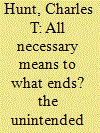

|
|
|
|
|
| Summary/Abstract |
A ‘robust turn’ in UN peace operations has ushered in a new generation of missions that are epitomized by increased authorization and willingness to use force towards the protection of vulnerable civilians and the implementation of stabilization strategies. This forceful transformation has important implications for not only particular components of the peace support effort but the overall endeavour. However, the potential unintended consequences remain underexplored and require further attention. This article examines the impacts of this so-called ‘robust turn’ in UN peace operations. The first section maps trends in modern peace operations that comprise the ‘robust turn’. It proceeds to explore a range of repercussions precipitated by these trends with particular focus on unintended consequences. The article concludes by identifying the associated implications for specific missions as well as the peacekeeping endeavour as a whole. It argues that the unintended consequences of the robust turn present significant principled and practical challenges for mission architects and managers, as well as their political masters, in achieving unity of effort in UN peace operations. It further argues that this could have ramifications for the future reputation, substance and viability of UN peacekeeping.
|
|
|
|
|
|
|
|
|
|
|
|
|
|
|
|
| 2 |
ID:
169245
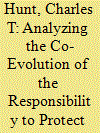

|
|
|
|
|
| Summary/Abstract |
This article analyses the Responsibility to Protect (R2P) in conjunction with the Protection of Civilians (POC) in peace operations. It examines where and how the two concepts have challenged, altered, led to reinterpretations and had feedback effects on each other. Drawing on methods from discourse analysis, the article examines their: gradual institutionalization at the United Nations (UN); deployment in the practices of the Security Council; and, influence over the actions of operations in the field. The analysis shows that the R2P has co-evolved with POC and particularly the implementation of POC through UN peace operations. The article illustrates that the emergence of the R2P and the trends in POC in peace operations have cross-fertilised in discourse and practice at the UN regarding the prevention and response to egregious of human rights abuses. It argues that this has influenced their respective trajectories with ramifications for understanding the normative trajectory and status of the R2P as it enters its third decade in popular lexicon. In particular, it posits that understanding the current and future status of the R2P will be enhanced by insights into how the R2P has shaped, but also been shaped by, other contiguous normative agendas, thematic areas and practices.
|
|
|
|
|
|
|
|
|
|
|
|
|
|
|
|
| 3 |
ID:
156245
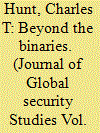

|
|
|
|
|
| Summary/Abstract |
The multiplicity of sources of security and justice in post-colonial states are often categorized according to a series of fixed analytical binaries. Such reductive dichotomies often mask the fluid and evolutionary ecology of these highly networked actors. As a result, the ways in which they co-produce social order are seldom well-understood and the ramifications for peacebuilding remain underexplored. This article examines the relationships between myriad providers of security and justice. Using examples from fieldwork in West Africa, it presents a case for a relational approach to peacebuilding that introduces the concept of symbiosis to develop a framework for evaluating these relations. It argues that the framework and conceptual steps involved create important opportunities for both new research and emerging practices of peacebuilding.
|
|
|
|
|
|
|
|
|
|
|
|
|
|
|
|
| 4 |
ID:
184460
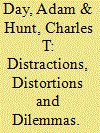

|
|
|
|
|
| Summary/Abstract |
This article explores the unintended consequences associated with the protection of civilians (PoC) mandate in United Nations peacekeeping. Drawing primarily on two case studies – the Democratic Republic of the Congo (MONUSCO) and South Sudan (UNMISS) – we advance three lines of argument. First, the gravitational pull of PoC can distract missions from other, often interdependent, priorities. Second, the implementation of PoC can distort intended impacts. Third, these distractions and distortions can combine to produce dilemmas for mission architects, leadership and implementers. We conclude by identifying how these quandaries can ultimately make civilian protection, sustainable peace, and mission exits more elusive.
|
|
|
|
|
|
|
|
|
|
|
|
|
|
|
|
| 5 |
ID:
147974
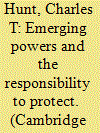

|
|
|
|
|
| Summary/Abstract |
The perceived clash of norms associated with the emergence of rising powers is nowhere more pronounced than in relation to the responsibility to protect (RtoP). However, attempts to explain rising powers’ engagement with norms such as the RtoP are often limited and limiting in what they can tell us. Orthodox models portray predominantly linear and diffusionist logics of norm evolution that underplay the complex interaction implicit in unpredictable outcomes at the systemic level. This article identifies a range of factors that drive participation (or generate hesitation) amongst emerging powers in the development and application of the RtoP. It proceeds to illustrate how changes in normative behaviour emanate from top-down and bottom-up processes as well as the feedback between them. It argues that norm evolution is consequently a unique and emergent outcome of complex international society and therefore argues for using complexity thinking as a heuristic to augment current models and explanations of the evolution of norms in the international system.
|
|
|
|
|
|
|
|
|
|
|
|
|
|
|
|
| 6 |
ID:
151299
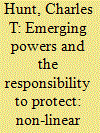

|
|
|
|
|
| Summary/Abstract |
The perceived clash of norms associated with the emergence of rising powers is nowhere more pronounced than in relation to the responsibility to protect (RtoP). However, attempts to explain rising powers’ engagement with norms such as the RtoP are often limited and limiting in what they can tell us. Orthodox models portray predominantly linear and diffusionist logics of norm evolution that underplay the complex interaction implicit in unpredictable outcomes at the systemic level. This article identifies a range of factors that drive participation (or generate hesitation) amongst emerging powers in the development and application of the RtoP. It proceeds to illustrate how changes in normative behaviour emanate from top-down and bottom-up processes as well as the feedback between them. It argues that norm evolution is consequently a unique and emergent outcome of complex international society and therefore argues for using complexity thinking as a heuristic to augment current models and explanations of the evolution of norms in the international system.
|
|
|
|
|
|
|
|
|
|
|
|
|
|
|
|
| 7 |
ID:
103674
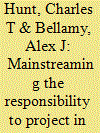

|
|
|
| 8 |
ID:
175363
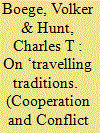

|
|
|
|
|
| Summary/Abstract |
Important sources of everyday security – variously labelled as customary, informal, traditional or autochthonous – are commonly associated with rural spaces and attributed to the lack of presence or traction of state institutions. However, these practices are not limited to peripheries; they can travel. Their structures, authority and legitimacy can be re-produced in new settings, often in response to the perturbations caused by conflict, while also changing in the course of travel. Consequently, in urban spaces – the supposed ‘centre’ of the modern state – people’s sense of security can be profoundly influenced and shaped by the ordering logics of such ‘travelling traditions’. This has ramifications for ‘emplaced security’ – both short-term responses to acute vulnerability of displaced communities and emergent longer-term forms of order. This article explores the utility of the ‘spatial turn’ in peacebuilding theory for better understanding this phenomenon. It uses the cases of Vanuatu and Liberia to demonstrate how more nuanced understandings of the (re)construction of authority between and across places and scales may help comprehend how people generate everyday emplaced security. A spatial approach provides analytical leverage that can help to highlight how a phenomenon such as travelling traditions contributes to the formation and substance of emplaced security.
|
|
|
|
|
|
|
|
|
|
|
|
|
|
|
|
| 9 |
ID:
189896
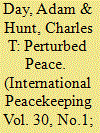

|
|
|
|
|
| Summary/Abstract |
This article explores the application of complexity theory to UN peacekeeping. To date, peacekeeping has been dominated by linear models of change, assuming that conflict settings can be addressed by elite-driven peace processes, gradual improvements to state institutional capacity, and development programming. However, this article argues that complexity theory offers a far more accurate and useful lens through which to view the work of peacekeeping: conflict settings represent complex, interdependent socio-political systems with emergent qualities giving them the capacity to self-organize via feedback loops and other adaptive activity. Self-organization means such systems are highly resistant to attempts to change behaviour via top-down or input-output approaches. In fact, peacekeeping itself is endogenous to the systems it is trying to change, often displaying the same kinds of self-organization typical of complex systems elsewhere. Drawing on experience working and conducting fieldwork in the UN peacekeping mission in Democratic Republic of the Congo, this article argues that UN peacekeeping operations should view themselves as actors within the complex conflict ecosystem, looking to enable transformational change from within, rather than impose liberal Western models from without.
|
|
|
|
|
|
|
|
|
|
|
|
|
|
|
|
| 10 |
ID:
170414
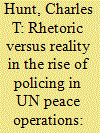

|
|
|
|
|
| Summary/Abstract |
United Nations police (UNPOL) have become increasingly important to operational effectiveness of peace operations. For some time, their contribution to re-establishing the rule of law in conflict-affected states has been seen as a cornerstone for building sustainable peace and enabling mission exit strategies. In a departure from traditional peacekeeping and post-conflict assistance, recent years have seen UN peace operations directed to stabilise countries and protect civilians in the context of on-going violent conflict. As a result, UNPOL have had to undertake a range of expanded tasks, exacerbating long-standing challenges and producing new impediments to their operational effectiveness. At the same time, a ‘pragmatic turn’ is generating increased interest in more police-centric concepts of peacekeeping as a possible alternative to today’s expensive and military-focused peace operations. Drawing on extensive fieldwork in multiple peace operations and at UN headquarters, this article examines the changing roles of UNPOL in a new breed of UN peace operations, identifies the major associated challenges and proposes a series of recommendations for overcoming them. It argues that if police are to respond to unfolding challenges while becoming more central to peacekeeping outcomes, then significant reforms and further research into their impacts will be required.
|
|
|
|
|
|
|
|
|
|
|
|
|
|
|
|
| 11 |
ID:
171076
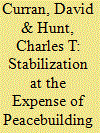

|
|
|
|
|
| Summary/Abstract |
The “uploading” of stabilization to UN peacekeeping presents conceptual, political, and practical challenges to the UN’s role in global governance and international conflict management. While scholarly research on stabilization has generally focused on militarization, its relationship to peacebuilding in the context of UN peacekeeping is underexplored. This article examines that relationship. A survey of UN policy frameworks highlights the simultaneous emergence of stabilization and clear expressions of peacebuilding. The article then draws on fieldwork in Mali and the Democratic Republic of Congo to illustrate how stabilization is displacing peacebuilding in the practices of UN peacekeeping. The article argues that the politics of stabilization impede local forms of peacebuilding, at odds with the “Sustaining Peace” agenda, and risks jeopardizing the lauded conflict resolution potential of UN peacekeeping.
|
|
|
|
|
|
|
|
|
|
|
|
|
|
|
|
| 12 |
ID:
142429
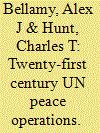

|
|
|
|
|
| Summary/Abstract |
United Nations peace operations are deployed in greater numbers to more difficult operating theatres in response to more complex conflict situations than ever before. More than 100,000 UN peacekeepers are deployed in missions mandated under Chapter VII of the UN Charter to use ‘all necessary means’ to protect civilians from direct harm as well as to achieve a host of other tasks such as supporting the (re)building of state institutions, facilitating humanitarian aid, and overseeing compliance with ceasefire agreements and political commitments. With increasing regularity, UN peacekeepers are instructed to complete these tasks in contexts where there is no peace to keep or where peace is fragile. To understand these changes, and the implications for UN peace operations, this article examines three key transformations: the emergence of the protection of civilians as a central mission goal (and accompanying principles of due diligence); a subtle move away from peacekeeping as an impartial overseer of peace processes towards the goal of stabilization; and a so-called ‘robust turn’ towards greater preparedness to use force. It identifies the challenges posed to contemporary UN peacekeeping operations by these transformations and evaluates the UN's efforts thus far to make peacekeeping fit for purpose in the twenty-first century, noting that while significant progress has been made in areas such as policy and guidance, force sustainment and deployment, and the application of force enablers, there remains a considerable way to go.
|
|
|
|
|
|
|
|
|
|
|
|
|
|
|
|
| 13 |
ID:
180387
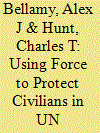

|
|
|
|
|
| Summary/Abstract |
The protection of civilians has become the principal issue on which UN peacekeeping missions are judged, but its principles and methods require refinement.
|
|
|
|
|
|
|
|
|
|
|
|
|
|
|
|
|
|
|
|
|